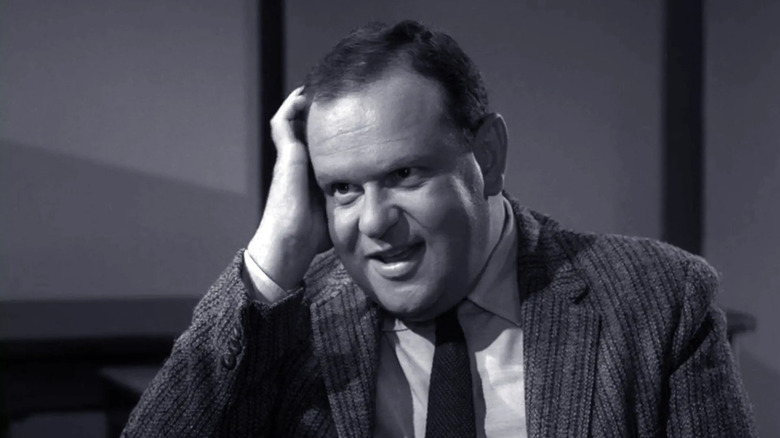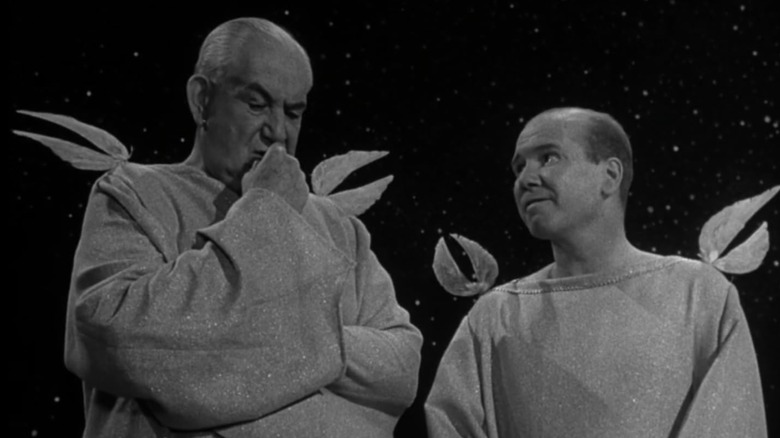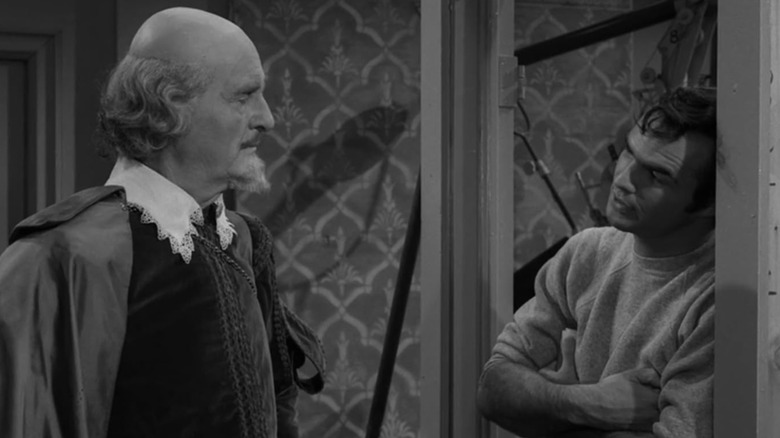The Worst Episode Of The Twilight Zone, According To IMDb
We may receive a commission on purchases made from links.
We talk a lot around here about the best episodes of "The Twilight Zone," an influential and heartfelt show that perfected the moralizing genre story more than half a century ago. There's no shortage of great episodes of Rod Serling's fantastical anthology series, from still-timely political allegories like "The Monsters Are Due on Maple Street" to innovative twist-filled tales like "The After Hours" and "Eye of the Beholder" to episodes with great punchlines, like "Time Enough at Last" (which was Serling's personal favorite) and "To Serve Man." When it comes to the question of which "Twilight Zone" episode is the best one, there are a dozen or more correct answers, but there's another question worth asking that's equally loaded: what is the single worst episode of "The Twilight Zone"?
You probably have an answer to this question in mind already. Despite its status as one of the best anthology series of all time (and the best TV anthology series, in our estimation), "The Twilight Zone" has plenty of episodes that fall flatter than the toy soldier who topples to earth in "Five Characters in Search of an Exit." The show's fourth season in particular is full of so-so episodes that stretch the limits of audience attention spans while stretching compact stories into longer runtimes. Serling's comical episodes generally miss the mark much more than its more dramatic outings, relying too much on silly musical cues and clownish, overdone performances while scripts suffer. Well over a dozen episodes of the landmark series have been ranked with a 6.5 rating or lower by viewers on IMDb, but there's one episode of "The Twilight Zone" that's more hated by fans than any other: "The Bard."
The Twilight Zone has some truly bad episodes
As the show's season 4 finale, "The Bard" is a culmination of both the show's experiment with overlong episodes and years of misguided comedic efforts. The episode has an impressively poor 5.6 rating on IMDb, with over 1600 viewers weighing in. Its closest competition in the race to the bottom is "Sounds and Silences," a grating season 5 episode about an obnoxiously loud man whose sense of sound becomes disturbed after his wife leaves him.
"The Bard" may not actually be the worst episode of the series (personally, I think season 1's "Mr. Bevis," the laugh-tracked "Cavender is Coming," the bland "I Dream of Genie," and the awkwardly dubbed "The Bewitchin' Pool" are all worse), but it is pretty bad, and its placement at the end of an exhausting season makes it feel like a final straw. The plot concerns a hack screenwriter (Jack Weston) who accidentally gets into black magic, using it to summon William Shakespeare (yes, really) to write the script for a TV show on his behalf. Shakespeare, played by "Dial M For Murder" actor John Williams, loses it when he finds out about the changes made to his script on set, and the episode ends with the writer conjuring up a whole host of historical figures — including Ben Franklin, Robert E. Lee, and Pocahontas — for his next project. Also, Burt Reynolds shows up playing a character named Rocky Rhodes.
The Shakespeare-starring The Bard is pure corn
While some "Twilight Zone" episodes fall short in their cultural commentary and others are painfully unfunny despite their comedic trappings, "The Bard" is mostly just witless. The protagonist's motivations and logic feel forced, and the episode spends too long hamming it up about Shakespeare's present day appearance and trying to make us laugh with pushy, "funny" sound effects and music. If the fable has any lesson at all, it's about not taking shortcuts or perhaps about the addictive pull of success and the pressure of translating great literary works to screen (as Serling often did). Yet, our main character learns nothing at story's end, and despite its ample runtime, the story feels underwritten, unfinished, and (the series' worst recurring sin) corny.
Despite its poor modern reception, "The Bard" hasn't always been totally hated. In his authoritative book on the series, "The Twilight Zone Companion," author Marc Scott Zicree praised the episode more than once. "With 'The Bard,' Serling pokes fun at the medium of television — the writers, the actors, the agents, the executives and sponsors," he wrote in the 1982 companion book. "Serling is on his home turf here, and one feels he took a delicious pleasure in writing this delightful episode." Zicree also calls the episode "both entertaining and accurate," but viewers today obviously don't seem to agree. But despite all its faults, there is at least one way in which "The Bard" has recently become more prescient than painful: its ridiculous plot sounds just like an ad for generative AI.


